Handball drills
- LH starts from the corner
- Goes by sliding passes to the left around the 1st pylon
- Then you go backwards around the pylon, which is on the free throw line.
- From there forward again to the circle and sideways to the left around the next pylon.
- Then go backwards around the pylon, which is on the free throw line. Etc.
- The next LH does not have to wait until the first one is on the right side,
- But he must wait until there is enough space so as not to bump into the previous LH.
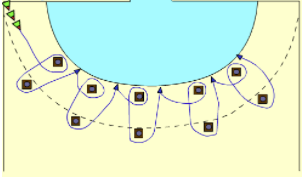
- Players stand back to back facing the wall at a distance of 4 to 5 feet.
- The first player throws the ball and gets out of the way of the second player who has to catch the ball.
- Then the second player throws and the third player catches the ball, etc.
- Variation:
- Larger run distance for being back in line.
- Put the pawn behind the row formed, they must first go around it before they can join the row.
- The first player has the ball.
- The ball is thrown against the wall and the first player jumps over the ball with their legs spread wide.
- The next player catches the ball and throws it against the wall.
- The first player joins the back of the row. Etc
- The exercise can also be performed as a competition.
- In which case the player who cannot catch the ball or jump over it must disappear from the line.
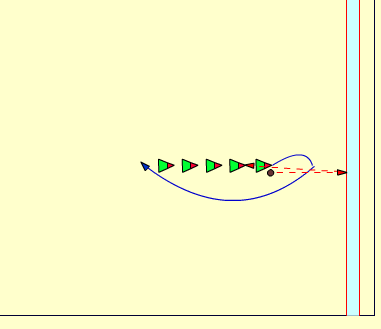
- Course with conditional elements
- Touch the first pylon.
- Slide into the square.
- Left/right first row then to second row.
- Repeat from the first row.
- Lift the knee of the ladder.
- Between the poles and finish on the target.
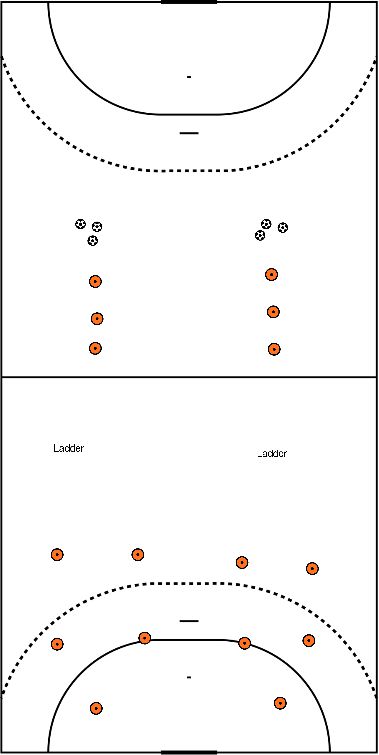
- You make pairs.
- These pairs start calmly walking through the hall with a ball.
- About every minute you make it a little faster.
- So we slowly work from a slow running pace to a sprinting pace.
- You can also choose to give different instructions to a pair.
- Examples of this are:
- Passes with a jump.
- Passes with 2 arms.
- Pass with 2 arms above the head.
- Sprint the other way after a pass.
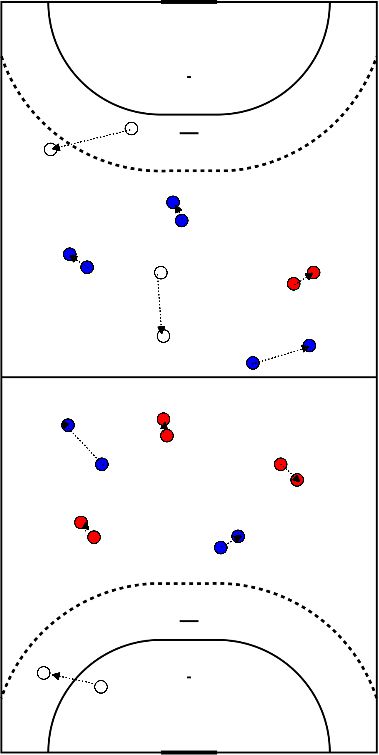
- 4 attackers.
- 3 defenders.
- 1 attacker stands like a circle in the middle.
- 3 defenders stand around it.
- The other attackers try to play the ball around by applying pressure.
- The attacker in the middle.
- Defenders try to intercept and prevent the attacker in the middle from receiving the ball.
- Attention defenders:
- Talking.
- Stepping out.
- Step back.
- Good foot forward.
- Blocking space with arms.
- Cover your back.
- See Insta-film.
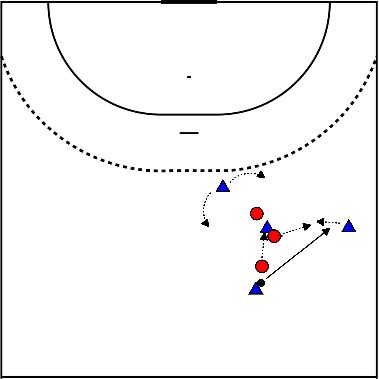
- From the left and right set-up positions, two ladders are laid out diagonally.
- The group is divided over the ladders, the goalkeeper stands on goal.
- The group on the left hand side starts with the ladders.
- After the last ladder they make a zero pass and finish on goal with a jump shot.
- When the first of the left group has reached the halfway point, the first of the right group starts.
- Variation in the laddering:
- 2 legs high speed through the ladder
- 2 legs in the ladder, then out ( jump )
- 2 feet on the ladder, 2 feet next to the ladder (dribbling).
- 2 passes to the front 1 to the back
- You can also place a passive defender for the players to shoot over.
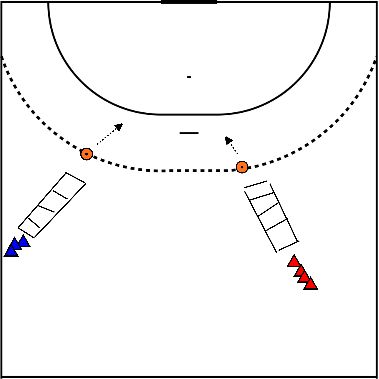
- All players stand on the side avenue, 4 lines are set out.
- At 70% you run to the first line and backwards back to the sideline.
- Then to the 2nd line and backwards, 3rd line etc.
- Variation:
- Bounce the ball
- Holding ball back
- We do this 4 times,
- 2 times without ball and
- 2 times with ball.
- In between 30 sec rest
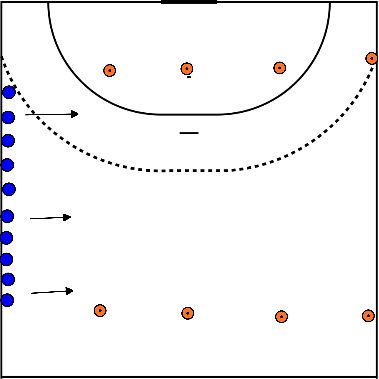
2 or 3 teams depending on the size of the group.
- Start all behind the pawn
- The first one starts and goes with 2 feet at the same time through the ladder, sprints to the pawn, goes around it and runs back to the group (not through the ladder again)
- Ticks the next player and he does the same.
- The team that is sitting down first has won.
Differentiation:
- Inclined through the running ladder ( face right or left)
- Backwards through the ladder
- Without ladder with ball and slalom (tipping)
- Slalom with the wrong hand (tipping)
- The focus here is on defending.
- Attackers are outnumbered, 3 and the defenders are 2.
- There is one attacker on the circle and two build-up players.
- The attackers are going to look for the defenders and try to play 1 on 1.
- The runner on the circle is going to offer herself and may also finish.
- It is important that the defenders talk to each other and step out and back in time.
Variation: 1 additional defender 3:3
- Everyone makes pairs and stands on the back line.
- Number 1 of the pair runs at about 70/75% to the back line and back again.
- Number 2 of the pair does a power exercise.
- When number 1 taps number 2, they switch.
- Then number 1 does a power exercise and number 2 runs.
- Strength exercise:
- Squats
- Jumping jacks
- Planks
- Wall sit (in the hall)
- Arms circling
- Lunges
- Dribble on the spot
- Sit ups
- Pass the ball in pairs with various exercises (2 balls per pair)
- 2 teams bring up the ball and pass back on the outside
- Bringing up a 3 team ball with 2 balls (middle player always rebounds)
- Bringing up a 3 ball team witha 2nd phase change whiskey (long change)
- Keepers warm up
- Star from the middle
- Bring up the ball at pace from 9 meter; defender starts from 6 meter
- Break in two:
- LO and LH run break together.
- Goalkeeper throws to LO or LH (assignment by trainer)
- 4 men bring up the ball
- Goalkeeper throws to LH.
- Ball away LH-LO-RO-RH who completes (RH goes deep and RO has to hold back a bit to speed up)
- RH puts pressure back
- Waves!
Players make a square and make sure two corners are double occupied.
BASIC:
Ball is played around clockwise. Players follow the ball. Receiver starts slightly in.
- Playing out of the run
- Play with jump shot
- On signal exercises turn
VARIANT 1:
Ball is played around clockwise. Players go counter-clockwise. Receiver starts slightly in.
- Playing out of the loop
- Play with jump shot
- On signal exercises turn
VARIANT 2:
Ball is played around clockwise. Players cross diagonally. Receiver starts slightly in.
- Playing from the run
- Play with jump shot
- Turn on signal exercises








